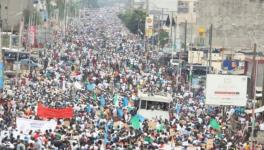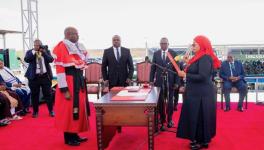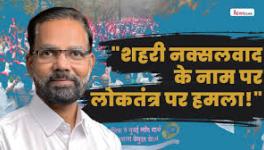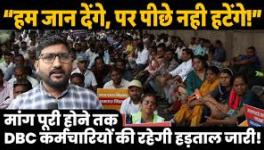Religious Minorities Worry More About Media Freedom Than Hindus: CSDS Survey
Hindus and religious minorities differ in their feelings and perceptions of Indian media and issues critical to its independence. This is one of the major findings of a media survey conducted by the Lokniti programme of the Centre for the Study of Developing Societies.
Conducted in 19 states, the survey shows more Muslims, Sikhs and Christians than Hindus think the media has become less free than before. They are also less inclined than Hindus to accept government surveillance, its regulation of social media platforms and its imposition of internet shutdowns.
These responses of religious minorities are of little solace in the larger dark picture the CSDS surveys paints—Indian media consumers harbour illiberal sentiments, are not passionate about protecting their right to free expression, and are seemingly untouched by the worries expressed over the media losing its freedom.
Consider this: 43% of those who watch or read news feel the media today is as free as it was before to show the “truth” or enjoys greater freedom than what it did a few years ago; only 30% of them think the media is less free than before, and a substantial 27% just do not have an opinion.
These are startling findings in the backdrop of the Indian State filing a slew of court cases against journalists. Add 43% and 27%, and you would not be wrong in thinking the State can still, without fearing a backlash, harass and pressure those waving the flag of free expression.
To be free, or…
In contrast to 45% of Hindu news consumers saying the media enjoys greater freedom than before, 33% of Muslims and only 28% of other communities (a category comprising Sikhs and Christians) support this contention. In all three categories, however, those with no opinion comprise over 25% each, suggesting they are most likely not even engaged in furious debates over the diminishing media freedom in India.
The scenario gets even more pessimistic over the issue of whether the government is morally right to carry out surveillance of social media platforms and messaging platforms. As high as 45% of social media users think the government is right in doing so, even though there are varying shades of agreement with the proposition, ranging from “fully right” to “somewhat right” or “right, if on the grounds of security”. Only 40% of them think it is “fully wrong” or “somewhat wrong”. The remaining 16% have no opinion.
After calculating the “net support” for government surveillance (that is, the proportion of those who consider it to be right minus the proportion of those who consider it to be wrong), the CSDS survey report says, “Of all the religious communities, Hindu social media users are the least opposed to/most supportive of surveillance of social media activities by the government. Muslims are relatively less supportive, and many among them preferred to stay silent on the matter.” Among all religious communities, Sikhs are most likely to consider surveillance wrong than right, says the report.
In a media consumption ambience where a substantial percentage of people are either indifferent or supportive of State surveillance, it does not come as a surprise that they would also object to opinions expressed against the government. The survey asked respondents: “People should be free to say whatever they feel about their government on social media or WhatsApp, however objectionable or offensive their opinion may be. Do you agree or disagree?”
Well, well, well—a shocking 45% of social media users say they should not be doing so, and 40% say they could. What kind of democracy is that where people themselves object to the voicing of opinions against the government?
Again, as against 45% of Hindus and 44% of Christians and Sikhs claiming social media and WhatsApp are safe places to express political opinions, only 37% of Muslims agree they are safe. Perhaps the response of Muslims is largely influenced by the State targeting them for their posts. A prime example of this was the Delhi Police relying on WhatsApp messages to accuse a group of Muslim youth leaders of conspiring to foment the 2020 riots in the Capital. The CSDS report, in fact, says, “Many Muslims also remained silent on the question and didn’t express their opinion on the issue.”
Shut them down
As many as 40% of Hindu social media users think there is nothing wrong with the government regulating social media. By comparison, only 31% of Muslims and 34% of other religious communities favour government intervention. It would seem Sikhs are the torch-bearers of media freedom, for the CSDS survey report especially mentions them for strongly opposing the idea of the State regulating social media.
Those who grew up before the advent of the internet wistfully think of what they might have been had they had access to the world wide web in their more youthful debates. They would have followed debates around the world, for instance. Or had greater opportunities to nurture their innate talent.
The CSDS survey shows, rather ironically, that 47% of active internet users (defined as those who confirmed internet usage for any purpose in the two months prior to the survey) believe it is right (that is, those who said fully right, somewhat right, or right, on grounds of security) for the government to shut down the net on the grounds of law and order. Only 36% say they do not endorse internet shutdowns.
The attitude towards internet shutdowns varies from community to community. Only 36% of Muslims endorse the shutdowns against 49% of Hindus and 47% of Christians and Sikhs doing so. This difference would have possibly ballooned had the CSDS also conducted its survey in Jammu and Kashmir, whose people have inordinately suffered from internet shutdowns. Conversely, Hindus perhaps endorse internet shutdowns because they have not had a prolonged experience of it.
The Hindu-Muslim divide is also reflected elsewhere—far more Hindus than Muslims trust the TV channels they watch, the newspapers they read and the news portals they visit.
There is, however, unanimity among all religious communities on one point—all of them believe the media’s portrayal of the Modi government is just “too favourable”. The clamour that the media is biased in favour of the Bharatiya Janata Party is not without basis. But for this exception, there is a clear distinction between the attitude of religious minorities and that of the majority community over the State’s oversight of the media.
Romancing the State
The CSDS survey report is not explanatory. Yet a few broad conclusions can be drawn from it. More Hindus than religious minorities seem to repose faith in the State—that it must have valid reasons to shut down the internet, regulate social media, and put what is a chaotic but democratic space under surveillance. Media freedom and the quality of our democracy is dependent on Hindus as they constitute 80% of the country’s population.
Religious minorities look askance at the State because they, particularly Muslims, have endured a vicious campaign of the BJP targeting them. A select band of TV channels and newspapers have echoed the BJP’s hate rhetoric, often fanning the flames of hatred. This is perhaps also why Muslims are less trusting of the media.
Yet we need to out in a caveat here: Given the experiences of Muslims since May 2014, the year in which Modi came to power, it is still surprising that 36% of them endorse internet shutdowns; or that 37% of them think social media and WhatsApp are safe places to express political opinions. These are just the spaces that bristle with hatred against them. It would seem they, like Hindus, also have an abiding faith in the State, making them presume it must have justifiable reasons to curb the right to free expression.
Perhaps a large number of Indians believe the State is their mai-baap, which, like parents, must be strict with children for the latter’s welfare. This attitude explains why people do not take to the streets over draconian laws such as the Unlawful Activities Prevention Act, or why the Supreme Court upholding absurd, anti-democratic amendments to the Prevention of Money Laundering Act does not trigger a public outcry. Or why the people are so reluctant to protest against dissenters being summarily packed off to jail.
Our democracy is widely regarded to have deepened. It has only in the sense of marginalised social groups being pulled into the democratic process and acquiring a degree of representation denied to them decades ago. In terms of ideas and ideology, our democracy remains shallow. That is undoubtedly the saddest part of the CSDS survey—and perhaps an impetus to strive towards inculcating the democratic spirit in the people of India.
The author is an independent journalist. The views are personal.
Get the latest reports & analysis with people's perspective on Protests, movements & deep analytical videos, discussions of the current affairs in your Telegram app. Subscribe to NewsClick's Telegram channel & get Real-Time updates on stories, as they get published on our website.
























